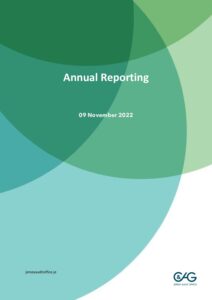
Wednesday 9 November 2022 - Report
Wednesday 9 November 2022 - Report
Topics: Accountability
Departments: All
Sector: All

Report: pdf (862.05 KB)
Download in full ↓An annual report is a key means by which an entity tells the story of its year. Public annual reporting, done well, enables stakeholders to understand – with trust and confidence – an entity’s strategy and the risks it faces, how much money has been spent and on what, and what has been achieved as a result. It enables stakeholders to hold the entity to account effectively.
I published reports in both 2020 and 2021 on Annual Reporting. My 2021 report concluded that few States established or States controlled entities had made significant progress in improving their annual reports for 2020 and that significant improvements were needed for most entities to meet best practice.
In order to promote best practice I published a Good Practice Guide to Annual Reporting in 2020 and a further one in 2021. In December 2021, I held a workshop on annual reporting and in February 2022 I published an Annual Report Self-Assessment Tool to assist organisations in the preparation of their annual reports.
Consistent with my reviews in 2020 and 2021 I have reviewed the annual reports and, where available publicly, the annual accounts produced by the States of Jersey and Jersey entities that were either:
· identified by the States of Jersey in its annual report as controlled by the States; or
· established by the States Assembly and required to prepare an annual report and/or accounts.
For 2022, I reviewed the 38 annual reports that were published by 31 July 2022. The purpose of my review was to assess progress being made in improving annual reporting and to identify and share good practice examples.
I reviewed the content of annual reports against:
· best practice identified by the UK National Audit Office
· the content requirements placed on UK public sector bodies that I consider to be best practice; and
· recognised best practice in sustainability reporting.
I have refined the criteria I have used in each year to reflect the most up to date best practice I have identified and used the criteria to develop a scoring methodology.
To assist entities in improving their performance I am also publishing a third Good Practice Guide updated for 2022 that draws out examples from the better performing entities.
The review has evaluated the 2021 Annual Reports of the States of Jersey, States controlled entities and entities established by the States, against updated criteria encompassing:
The review sought to identify the progress being made by entities in improving their annual reporting. It also sought to identify and share good practice through the publication of a further Good Practice Guide.
Annual reporting is fundamental to ensuring accountability of public entities.
I am pleased with the improvements I have seen in the annual reports of many States controlled and States established entities. I encourage entities to consider the issues raised in this report and my Good Practice Guides and continue to make further improvements.
The States of Jersey have an opportunity to build on the progress made by individual entities by specifying the requirements for annual reporting. In doing so, the States should pay particular attention to:
· accountability reporting, especially staff and remuneration disclosures; and
· sustainability reporting.
So as to help the States of Jersey and individual entities focus their actions, I have consolidated the findings from this report and recommendations from my 2020 and 2021 reports into a single set of recommendations. This is set out in Appendix Four.

Wednesday 9 November 2022 - Report

Associate Member of EURORAI - a cooperation project between public sector supervisory bodies in Europe